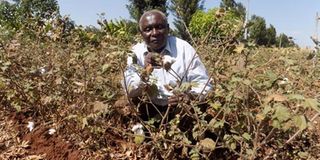The business opportunity I have seen in growing cotton

Joseph Thika at his cotton farm in Nyangati, Kirinyaga County. PHOTO | RACHEL KIBUI |
What you need to know:
- The once thriving cotton growing and ginneries have been ailing over the last few decades
- But Peter Munga is buying ginneries and contracting farmers.
The once thriving cotton growing and ginneries have been ailing over the last few decades. Most of the country’s ginneries closed down as farmers abandoned the once top-cash spinner. Yet against this grain, leading entrepreneur Peter Munga is buying ginneries and contracting farmers. He spoke to Rachel Kibui.
What have you seen in cotton?
I have seen value addition. I am distributing cotton seeds to farmers around Meru, Embu, Lower Kirinyaga and Tharaka and I have created a ready market for their harvest.
I bought Meru ginneries close to two years ago. I worked in the Ministry of Agriculture back in the 1980s when cotton was a major cash crop.
I know that the crop still has great potential that has barely been exploited. But I want to take it beyond where it was more than three decades ago.
You mentioned value addition. What exactly do you do?
I plan to start manufacturing sanitary towels and diapers. Kenya does not need to import these necessities while we can make them locally and sell affordably.
Farmers will grow the crop once they have a market. Last year, I distributed 200 tonnes of cotton seeds to over 300,000 farmers.
This means I created employment to farming families because their land are unsuitable for most other crops.
Where do your seeds come from?
I have a seeds processing plant in Murang’a, my native county. The seeds are high quality and can give good yields to farmers who in turn will earn good income.
The backbone of any agribusiness is high quality seeds and that is why I have ensured that they are accessible to the target farmers.
Besides cotton seeds, I also produce others such as groundnuts, sunflower, maize and vegetables for commercial purpose.
There is money in cotton?
Yes there is. I would not venture into it if I did not expect to earn. The textile industry in Kenya has a lot of opportunities because currently the country does not meet its quota in the African Growth and Opportunity Act opportunities to access the market in America.
This means there are ready buyers if people decide to pay farmers well and if investors concentrate on value addition.
If I can afford to pay over 300,000 farmers in the farms and another 100 employees at the ginnery, it means that I am making some money.
What ails the sub-sector?
The country has opened up too much of the market to imports, including second-hand clothes. I think we need to be proud of our own textile productions and shun imports.
We should manufacture textile locally instead of depending on imports. Why would one be proud of wearing something that someone else had worn?
I don’t want to say that mitumba should be banned, but I believe everyone should be proud of being the first user of his clothes.
It will take some time to win the confidence of cotton farmers, but I am getting there.
I believe our youth will soon see the light and embrace farming by knowing that even arid areas have great potential as long as people farm the most suitable crops for their areas.
But pests are a big menace too, right?
I must admit that the African bollworm, the cotton stainer, aphids and mites are a major challenge in cotton farming.
However, they are manageable if farmers keenly follow the right procedures on pest and diseases control and management.
For every kind of farming, key attention to manage the pests and diseases to maximise on harvest is crucial, and cotton is no exemption.
What is your advice to farmers in dry areas?
They must embrace agribusiness instead of waiting for white collar jobs. Everyone, whether you are in dry or wet areas, must see land as a source of wealth.
We must all exploit the potential of farming by growing what is suitable for our regions.
Kenyans must stop treating employment as the sole source of income and embrace a mentality of ‘employing’ not being ‘employed’.
A person earning Sh100 a day in the farm is much better than a person earning thrice the amount in urban areas because the one in the farm has less expenses such as transport, rent and food.





